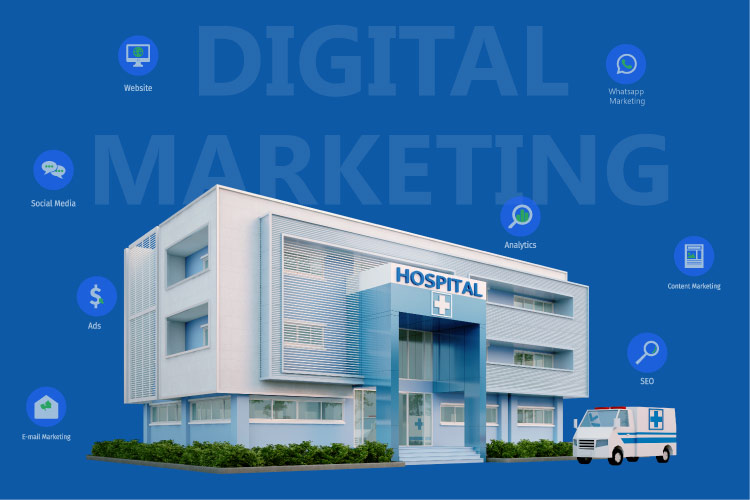
Digital Marketing for Hospitals: Strategies That Drive Results and Revenue
February 4, 2025Book A Free Demo
Latest Marketing Articles
Book A Free Demo
Imagine a future where diseases are detected before symptoms emerge, hospitals operate with streamlined precision, and clinics predict patient needs in advance. This future isn’t decades away—it’s happening now, powered by Artificial Intelligence in Medicine.
Across the globe, AI in Healthcare is revolutionizing how medical practices approach treatment, management, and marketing. Let’s delve into how AI is paving the way for a smarter, more efficient healthcare system and reshaping the dynamics of patient care.
The integration of AI in Healthcare into digital marketing for hospitals is not just a technological advancement; it’s a strategic necessity. With healthcare becoming increasingly competitive, hospitals and clinics are leveraging AI to enhance patient engagement and retention.
Personalized marketing strategies driven by AI analyse patient demographics, behaviour, and preferences to deliver targeted campaigns.
For example, AI tools can identify patients who missed follow-ups and send automated reminders, improving care continuity and loyalty. Predictive analytics further allow medical practices to anticipate trends, enabling proactive health campaigns. By embracing these tools, healthcare providers can develop a stronger connection with their patients and continuously engage them in their healthcare journey. This builds trust while improving patient retention—a critical metric for sustainable growth.
AI is transforming diagnostics by reducing human error and enabling faster, more accurate outcomes. Machine learning algorithms analyse vast datasets to identify patterns that escape the human eye. In India, this has a profound impact, particularly in resource-limited settings. AI in Healthcare tools can detect diseases like tuberculosis from chest X-rays or predict cardiovascular risks based on subtle ECG variations. Such innovations significantly improve the early diagnosis of conditions that may otherwise be missed, especially in regions with limited access to specialists.
Moreover, Artificial Intelligence in Medicine is enabling precision medicine, which tailors treatment plans to individual patients. AI-driven platforms aggregate data from genetic testing, lifestyle choices, and previous treatments to generate highly personalized care plans. This personalization improves outcomes while reducing unnecessary costs, making healthcare more accessible and practical—an essential step towards the future of healthcare. For example, hospitals are increasingly relying on AI to analyse genetic markers and customize oncology treatments, ensuring the best possible response for patients undergoing cancer treatments. The result is improved treatment effectiveness and reduced risk of adverse reactions.
AI doesn’t just improve clinical outcomes; it reshapes how patients interact with healthcare systems. Virtual assistants and AI-powered chatbots answer queries, schedule appointments, and provide health reminders, making healthcare accessible anytime, anywhere. This is a game-changer for patients, especially in a country like India, where healthcare accessibility can often be limited by location, time, or availability of professionals.
For doctors and administrators, this automation reduces time spent on repetitive tasks, freeing up resources for more critical patient care. A study by Mayo Clinic highlights how AI-powered tools improve patient satisfaction while reducing operational inefficiencies—a win-win for both patients and providers. These virtual assistants can also gather crucial information from patients, providing doctors with a more comprehensive understanding of the patient’s needs before they even walk into the clinic. This seamless interaction enhances the overall patient experience and fosters a deeper trust in medical practices.
In an era of misinformation, medical practices must establish authority and trust. AI-powered tools like reputation management systems monitor online reviews and feedback, ensuring that positive patient interactions are highlighted. This not only drives credibility but also attracts new patients searching for reliable healthcare providers. Hospitals and clinics with strong online reputations are more likely to be trusted by patients who are increasingly relying on digital platforms to make healthcare decisions.
AI is also pivotal in addressing health misinformation online. By analysing trends and creating evidence-based content, clinics and hospitals strengthen their digital presence while ensuring public access to accurate medical knowledge. In addition, AI tools help medical practices stay on top of patient reviews and feedback, ensuring that any concerns are addressed quickly, and positive patient experiences are highlighted. A strong online presence built with AI ensures that hospitals and clinics can remain ahead of the curve in terms of patient engagement and retention.
AI’s impact extends beyond diagnostics and marketing—it’s revolutionizing how healthcare services are delivered. AI tools can streamline administrative tasks, automate patient record management, and even optimize staff schedules. This means reduced operational costs, fewer errors, and better resource management for hospitals. With AI in Healthcare, administrators can utilize predictive analytics to anticipate patient volumes, allowing them to allocate resources efficiently.
This also ensures that doctors are seeing the right patients at the right time, minimizing wait times and enhancing patient satisfaction. Such operational efficiencies improve the quality of care and make healthcare delivery more cost-effective, which is especially important in hospitals and clinics serving large populations.
The integration of Artificial Intelligence in Medicine is not just about embracing technology; it’s about reimagining the possibilities of healthcare. From empowering doctors with predictive insights to reshaping patient engagement through AI in Healthcare, the transformation is profound.
For hospitals and medical practices ready to embrace this revolution, the question is not “if” but “how.” By adopting AI tools for digital marketing for hospitals, patient care, and operational efficiency, healthcare providers position themselves at the forefront of the industry’s future. The benefits of AI go beyond just improving medical outcomes—they’re integral to enhancing patient retention, engagement, and satisfaction, which are critical for sustained growth in an increasingly competitive healthcare landscape.


